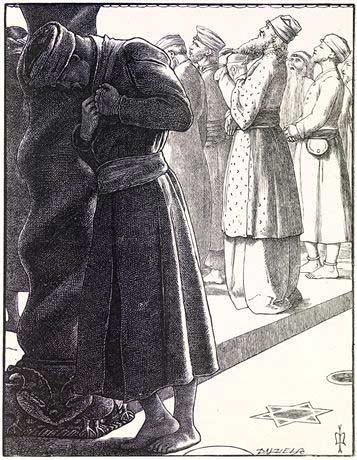Younger Brother
Two major faiths survived the flaming wreckage of second temple
Judaism: Christianity and Rabbinic Judaism. Objectively,
Christianity is the elder of the two estranged siblings, arising in
the first century A.D. Rabbinic Judaism, a creative improvisation
striving to craft a functioning religion after the destruction of the
temple and the expulsion of the people from the land, took shape
several centuries thereafter. In the centuries subsequent to Bar Kochba's failed
Messianic revolt in the early second century, the Rabbis invented a new religion, and codified their
progress in the Talmud. See from Rabbi Boteach's own words how novel is
Rabbinic Judaism: "Judaism resoundingly denies the idea that people
need an intermediary between themselves and God." (Boteach, Shmuley
(2011-12-07). Kosher Jesus (p. 162). Gefen Publishing House. Kindle
Edition.) Really, no high priest? Well now, of course not, nor any
temple, the Romans took care of that. By adopting the conceit that Moses
transmitted an oral tradition in addition to his written revelation,
Rabbinic Judaism supplies itself with the ancient heritage
it otherwise lacks.
Care should be taken to avoid the anachronism of thinking
Rabbinic Judaism is the ancient faith of Israel. Author Shmuley
Boteach, who reinvents Jesus of Nazareth in his popular book 'The
Kosher Jesus,' takes the ahistorical view that Judaism has never
changed, and that thus whatever modern Jews may happen to think on
any topic can safely be projected back into the first century. The
reader who can share this belief is an adept of the sort
who can easily believe ten impossible things before breakfast. The mismatch
is glaring: Biblical religion is premised on the idea of blood atonement:
". . .for it is the blood that maketh an atonement for the soul."
(Leviticus 17:11). But where is the blood now? The
Rabbis have discovered there is no need. How convenient! Since, "to declare
sacrifices of the essence of Judaism would have been to pronounce modern
Judaism an impossibility." (Alfred Edersheim, The Temple, Its Ministry
and Services, p. 74). Other readily available things will make do: "From
this it may be inferred that when a sage lectures to the public it is
accounted to him in Scripture as if sacrificing fat and blood upon the
altar." (The Babylonian Talmud, edited by Michael L. Rodkinson, Volume 9, Tract
Aboth, Chapter I, Kindle location 37040). Thus Judaism became a
bloodless religion of legal scholarship. Rabbinic Judaism is an application of the principle, when life hands you lemons, make
lemonade.
This tendency to back-date everything Jewish and post-date
everything Christian leads to 'time travel.' The 'Kosher' Jesus (a
prophet indeed!) studies the Talmud, not yet compiled, and quotes
Rabbi Tarphon, not yet among the living:
"Jesus was equally familiar with Talmudic sayings. When
Jesus instructs his listeners, “First take the plank out of your own
eye, and then you will see clearly to remove the speck from your
brother’s eye,” he alludes almost word for word to a Talmudic
teaching of Rabbi Tarphon: “If someone urges you to remove the speck
from your eye, he must be given the answer, ‘Take the plank out of
your own.’” (Boteach, Shmuley (2011-12-07). Kosher Jesus (pp.
23-24). Gefen Publishing House. Kindle Edition.)
Normally when an earlier figure quotes a later speaker "almost word
for word," the earlier is not suspected of borrowing from the later, but
the other way around. The Talmudic authors are very conscious of precedence,
yet the Talmud admits its own process is subject to manipulation: "In
truth this is not so. R. Jose never said this; but Rabba asserted this
in the name of R. Jose so that R. Joseph should listen to him; for it
was known that R. Jose was final authority and that the Halakhas
prevailed according to his opinion." (The Babylonian Talmud, edited by
Michael L. Rodkinson, Volume III, Section Moed, Tract Erubin, Chapter
IV, Kindle location 11166). Yet surely where even the quoted authority
is later, it cannot be back-dated! It would be a profitable study to find all the
unacknowledged quotes of Jesus of Nazareth in the Talmud, because there are
many such parallels. And where does
that mysterious word 'Metatron' come from, as for instance, "It was Metatron
[who said that], he replied, whose name is similar to that of his
Master, for it is written, For my name is in him. But if so, [he
retorted,] we should worship him!" (Babylonian Talmud, Tractate Sanhredin,
38b): "To him that overcometh will I grant to sit with
me in my throne, even as I also overcame, and am set down with [meta] my
Father in his throne [throno]." (Revelation 3:21).
The revisionist 'Jesus' presented in this book is a familiar
figure to readers of old-line Socialists like Karl Kautsky: He is
Jesus the Revolutionary, this time tricked out with side-curls:
"The stage has been set for us to see Jesus for who he
truly was: a wise and learned rabbi who despised the Romans for
their cruelty to his Israelite brethren, who fought the Romans
courageously and was ultimately murdered for trying to throw off the
Roman yoke of oppression." (Boteach, Shmuley (2011-12-07). Kosher
Jesus. Gefen Publishing House. Kindle Edition.)
He has inherited all of the problems inherent in the original
socialist 'Revolutionary Jesus:' the very extensively documented moral teachings do not line up
with the new beret and Kalashnikov, so they must be discarded; it is far
from obvious how a small strike force armed with two swords expects to take down an empire;
scissors must be taken to passages like "My kingdom is not of this
world" (John 18:36), etc. How else to make room for 'Jesus of the
Loud Battle Cry:' "An armed insurrection against Rome was his battle cry. .
." (Shmuley Boteach, The Kosher Jesus, p. 142). There is not much that is new in this book, and very little of
interest. Rabbi Boteach breathlessly informs us that Jesus quoted the Old
Testament,— can anyone have thought otherwise? Any reader equipped
with a 'Chain Reference Bible' could, with the investment of a rainy afternoon's
effort, come up with a much fuller assortment of citations than does our author, which makes you wonder why he did not equip himself
with such a resource before undertaking the project. The only novel twist
our author contributes is that now our 'Jesus the Revolutionary' utters
the implied threat: accept me as I am or be outed as an anti-semite.
Funny, some of the folks who used to pitch the 'Revolutionary
Jesus' were Nazis: "My feeling as a Christian points me to my Lord and
Savior as a fighter." (Adolf Hitler, speech of 12 April 1922, quoted p.
311, The God Delusion, Richard Dawkins).
Rabbi Boteach relies upon the scholarship of Hyam Maccoby, who,
however, does not consider Jesus to have been a fighting failed Messiah like
the violent bar Kochba, but rather a failed Messiah of the
"non-militarist enthusiast" school (Hyam Maccoby, The Mythmaker:
Paul and the Invention of Christianity, p. 37). Maccoby admits that Jesus
never took up arms against the Romans: "The analogy between Theudas (or
the proto-Theudas in the original source) and Jesus is closer than the
analogy between Jesus and Judas of Galilee, for Jesus never engaged in
organized military activity, but, like Theudas, relied on a miracle from
God." (Hyam Maccoby, The Mythmaker: Paul and the Invention of
Christianity, p. 53.) Given that, as is admitted, Jesus never took up
arms against Rome, it is far from obvious why the impetus for His
execution would come from that quarter. To assume, as does
Rabbi Boteach, that all Messianic aspirants fit within his Zionist
freedom fighter model, suggests very limited awareness of actual
Jewish Messianic aspirants down through history.
It might seem fine to say, with our author, that virtuous men
should fight against oppression. But how does that mandate operate
in an actual conflict situation, like the struggle between the
Israeli overlords and the Palestinian inhabitants of the occupied
territories? Both sides are convinced that they already are fighting
oppression. The bias people inherit in favor of their own side makes
the rubric, 'fight oppression,' into a mandate for endless war.
Better to teach, as Jesus did, that God looks with favor on those
willing to sacrifice their own legitimate interests; then it is at
least theoretically possible that someday there might be peace.

|



















